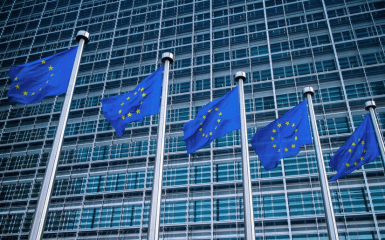The countries of the European Union could not agree on the 14th package of sanctions against Russia, because Germany blocked its adoption.
Points of attention
- Clause 12G, which was supposed to limit the re-export of goods to Russia through subsidiaries in third countries, was excluded due to the outrage of Germany.
- The new package of sanctions was supposed to include additional restrictions on 21 Russian companies and make it more difficult for businesses to circumvent existing sanctions.
- The debate over the new sanctions package will continue, given the potential implications for Russia's economy and politics.
EU disagreed on the 14th package of sanctions against Russia
EU diplomats said Germany's indecision was partly due to internal differences between its foreign ministry and the chancellor's office.
Earlier, the EU excluded one of the items from the new package because Germany considered it problematic. It extended the effect of the so-called "prohibition clause on Russia" to subsidiaries in third countries. According to diplomats, Article 12G was excluded from the compromise text circulated among member states shortly before the ambassadors' meeting.
According to the draft of an early version of the package, this clause was supposed to force the subsidiaries to "contractually prohibit re-export to Russia and re-export for use in Russia."
According to diplomats and sources, Germany's hesitation was partly due to internal differences between the Foreign Office and the Chancellor's Office.
The deleted provision was an extension of the "no-Russia provision" to subsidiaries in third countries. The clause would force those subsidiaries to "contractually prohibit re-export to Russia and re-export for use in Russia."
As Politico writes, Berlin was concerned about this clause because it forced EU companies to guarantee that their customers would not be able to sell goods to Russia under sanctions.
Previously, the "no-Russia clause" only applied to firearms, munitions, and dual-purpose goods that had both military and civilian uses. Germany worried that its small businesses would suffer if this were extended to more civilian products such as chemicals or metalworking equipment.
The ambassadors will continue the debate on June 20.
What is known about sanctions against Russia
Since the beginning of the full-scale aggression against Ukraine, the European Union has already introduced 13 packages of sanctions aimed at undermining the Russian economy and military capabilities. Work on the 14th package of sanctions is well underway and is expected to include additional restrictions against 21 Russian companies.
In addition to strengthening sanctions, the new package is also designed to make it more difficult for businesses to circumvent existing restrictions.
It was reported that the EU countries could not agree on the 14th package of sanctions against the Russian Federation through Germany.




